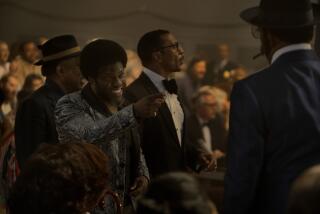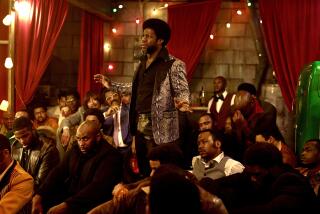A Dark ‘Night of the Hunter’
- Share via
“The Night of the Hunter,” the only film directed by British actor Charles Laughton, is probably the least-seen great American film. Laughton, working from a script by critic and essayist James Agee, fashions a movie like no other--a timeless mixture of fairy-tale clarity and expressionistic darkness, played with the gusto of a Hollywood horror film of the 1930s.
The story is simple: A young man struggling to support his family during the Depression robs a store and gets shot in the process. Before he is captured, he gives the loot to his young son for safe keeping. In prison, before his death, the robber tells Harry Powell, a Bible-thumping preacher in jail for stealing a horse and carriage, about the money. Once released, Powell heads out in search of the widow (Shelley Winters) and her family and what he hopes is a tidy sum of money.
As Powell, Robert Mitchum gives an outrageous yet totally controlled performance. He shows off his knuckle tattoos--HATE on one hand, LOVE on the other--and works himself up preaching the Good Word. You can see by the gleam in his eye that he’s having the time of his life conning the small-town folks about his “concern” for the widow. Only the widow’s young son can see through Powell as he courts and marries the woman.
Through the randomness of his insanity and his uncalculated actions, Mitchum’s Powell becomes one of cinema’s most evil characters. He has much in common with Dennis Hopper’s Frank Booth in “Blue Velvet”--except religion is Powell’s drug of choice.
What one sees in the first hour of “The Night of the Hunter” is a ferocious performance in a rather standard film, spiced with some psychosexual overtones. (Powell is disgusted by the widow’s desire for sex on their wedding night, while it seems to be her sole reason for marriage.) In the film’s final 30 minutes--dominated by silent-screen legend Lillian Gish--it becomes clear that, beyond its attacks on religious fervor and greed, the movie is really about the sanctity of children.
The widow’s children end up in the care of Gish’s character, Rachel, who runs a shelter for abandoned children, after they escape from Powell. Unlike the rest of the adults in the film, she immediately recognizes Powell as evil and boldly stands up to him. Like a good fairy for children, she makes everything right.
Though released in 1955, “The Night of the Hunter” could just as easily be a 1936 or 1943 or 1974 film. In fact, it most resembles a silent film in the way Laughton and cinematographer Stanley Cortez emphasize the meaning of images over words. But to compare this film to others is pointless; it remains one of a kind.
“The Night of the Hunter” (1955). Directed by Charles Laughton. No rating. 93 minutes.
More to Read
Only good movies
Get the Indie Focus newsletter, Mark Olsen's weekly guide to the world of cinema.
You may occasionally receive promotional content from the Los Angeles Times.










